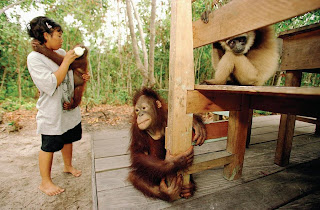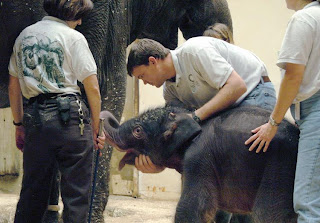IIPM MANAGEMENT INSTITUTE
Edens for Asia’s wild waifs.
We
 live in an age where the pressures and the pace of life are crushing the globe into increasingly confined corners, displacing huge swathes of population from Darfur to Dhaka. So it should be no surprise that in this conflict ridden world, where all creatures big and small were born equal, animals are oft en considered more disposable than toilet paper. But in the race to the everelusive finish line, some do pause to catch their breath and look around.
live in an age where the pressures and the pace of life are crushing the globe into increasingly confined corners, displacing huge swathes of population from Darfur to Dhaka. So it should be no surprise that in this conflict ridden world, where all creatures big and small were born equal, animals are oft en considered more disposable than toilet paper. But in the race to the everelusive finish line, some do pause to catch their breath and look around.Pinnawala is a small, indistinct town, 90 kms from Colombo, which hides an environmental jewel.
 Home to one of the biggest elephant orphanages, Pinnawala started in 1975, and has now ballooned to shelter a mammoth number of 84 elephants. This is also the greatest herd of elephants in captivity anywhere in the world. Typical animals that are brought in are jumbo babies whose mothers have either been killed or have deserted them. But the fact of paramount importance is that these elephants are released into the wild once they are mature enough to take care of themselves. And how do they do that? They are taught right from the beginning to look for food and water reserves. The gentle giants’ daily routine includes breakfast sharp at eight, which is honey and oats for the babies and a walk for 3 hours. After that, they are walked for about 400 metres to River Maha Oya, where they skinny-dip and sun bathe for a good two hours, following which they rest and are served their evening meal. All in all, each pachyderm eats approximately 75 kgs of leaves and shrubbery. The babies are a sheer delight to watch with their fast paced trudging to keep up with their mothers or when they waddle in the shallow waters. One cannot help but smile satisfactorily when one sees the magic of the animal kingdom come alive here.
Home to one of the biggest elephant orphanages, Pinnawala started in 1975, and has now ballooned to shelter a mammoth number of 84 elephants. This is also the greatest herd of elephants in captivity anywhere in the world. Typical animals that are brought in are jumbo babies whose mothers have either been killed or have deserted them. But the fact of paramount importance is that these elephants are released into the wild once they are mature enough to take care of themselves. And how do they do that? They are taught right from the beginning to look for food and water reserves. The gentle giants’ daily routine includes breakfast sharp at eight, which is honey and oats for the babies and a walk for 3 hours. After that, they are walked for about 400 metres to River Maha Oya, where they skinny-dip and sun bathe for a good two hours, following which they rest and are served their evening meal. All in all, each pachyderm eats approximately 75 kgs of leaves and shrubbery. The babies are a sheer delight to watch with their fast paced trudging to keep up with their mothers or when they waddle in the shallow waters. One cannot help but smile satisfactorily when one sees the magic of the animal kingdom come alive here.Another
 such prominent reconstructed paradise is an orangutan school in Borneo. The Nyaru Menteng Orangutan Reintroduction Project is situated 28 kms outside of Palangka Raya. This island hosts a team of dedicated volunteers with years of experience in training and readying rehabilitated orangutans to survive in the wilderness. With 43 large orangutans, it is one of the biggest such schools in Borneo. If not for being brought here, the most famous residents of this island, the orangutans, would have had suffered neglect and hunger at the hands of the plantation workers. Orphaned orangutans, used to staying with their mothers for up to six years, are handled and looked after with great sensitivity and care. Once they outgrow their quarantine stage, they are handled by a 24-hour expert staff to teach them how to climb trees and look for food themselves. One precondition for these orangutans to
such prominent reconstructed paradise is an orangutan school in Borneo. The Nyaru Menteng Orangutan Reintroduction Project is situated 28 kms outside of Palangka Raya. This island hosts a team of dedicated volunteers with years of experience in training and readying rehabilitated orangutans to survive in the wilderness. With 43 large orangutans, it is one of the biggest such schools in Borneo. If not for being brought here, the most famous residents of this island, the orangutans, would have had suffered neglect and hunger at the hands of the plantation workers. Orphaned orangutans, used to staying with their mothers for up to six years, are handled and looked after with great sensitivity and care. Once they outgrow their quarantine stage, they are handled by a 24-hour expert staff to teach them how to climb trees and look for food themselves. One precondition for these orangutans to  be released back in the wild is that they must have adequate food and water supplies and natural habitat to call home. However, mindless deforestation has gnawed away at orangutans’ natural habitat as well. While these lovable creatures are getting ready to be back where they belong, authorities are finding it increasingly tough to relocate them.
be released back in the wild is that they must have adequate food and water supplies and natural habitat to call home. However, mindless deforestation has gnawed away at orangutans’ natural habitat as well. While these lovable creatures are getting ready to be back where they belong, authorities are finding it increasingly tough to relocate them.Though these places are a wonderful microcosm, let’s hope that they do not become a peepshow to the future where these orphanages might be all that remain of a once thriving wild population.’
Edit bureau: Ashish Pratap Singh
For Complete IIPM Article, Click on IIPM Article
Source : IIPM Editorial, 2007
An IIPM and Professor Arindam Chaudhuri (Renowned Management Guru and Economist) Initiative
For More IIPM Info, Visit Below....
ARINDAM CHAUDHURI’S 4 REASONS WHY YOU SHOULD CHOOS...IIPM :- Cicero's Challenge is going global
The Indian Institute of Planning and Management (I...
After CDMA, will nokia miss the 3G bus ?
Time for Awards at IIPM
STUDENTS AGAINST CORRUPTION & KICKBACKS : SACK
HRIC :- Human Resource Intelligence Cell
Heavy dut(t)y stress Sanjay Dutt Bollywood Actor
The Business of B-School Rankings & The Big Farce
36TH Full Time Programme In Planning & Entrepreneu...
Courtney to quit courting cigarettes!
No comments:
Post a Comment